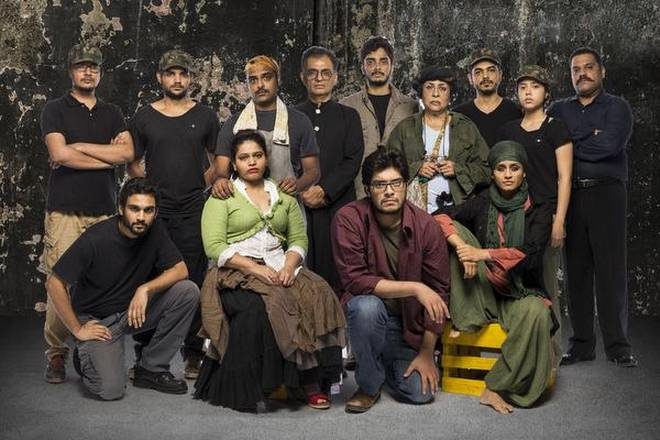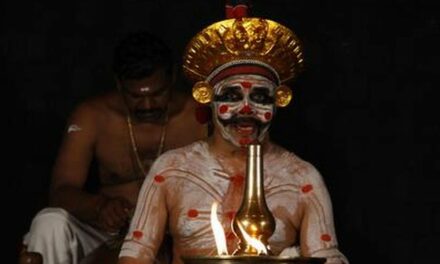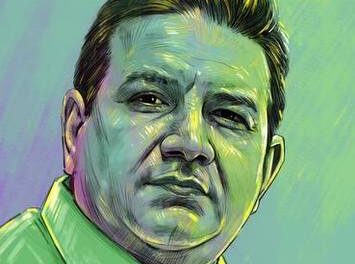Quasar Thakore Padamsee’s staging of what is hailed as the greatest anti-war statement brings Arundhati Nag back to the Mumbai stage after four decades.
When Quasar Thakore Padamsee first read Bertolt Brecht’s Mother Courage and Her Children, many years ago in college, he felt empty and drained afterward, as if he had lost his soul to the play. Set during the long and protracted Thirty Years War, the raging catastrophe that ravaged Central Europe in the 1600s, the Brecht masterpiece was one of those “must read” tomes for all budding theatre practitioners. At that time, Padamsee had imagined it to be quite un-stageable in India, due to the sporadic and dispersed quality of the narrative, its epic compass, or even its inalienably European setting.
Savoring truths
This year, Padamsee has taken a gigantic leap of faith and finally helmed a production of the play. This has been mounted by Q Theatre Productions (QTP) under the aegis of the Aadyam initiative, that continues to provide a grand canvas to many of the city’s theatre-makers. Opening tonight, the ambitious venture comes two decades after the director’s first outing while still in college — Jerome Lawrence and Robert Edwin Lee’s Inherit the Wind — so it’s likely to be a testament of the directorial chops he’s picked up along the way. The revival in interest partly owes to a scene-study class Padamsee taught last year at the Drama School Mumbai, which allowed him to analyze the play minutely — marveling at the elements coming together, enjoying even the most fleeting of characters, and savoring the “truths” Brecht’s prose frequently threw up.
The eponymous Mother Courage is a profiteer who benefits from the industry of war, selling bread to both sides. She risks her life not for a cause, but for the lure of a pure enterprise. During this interview, Padamsee frequently quoted lines from the play. In one scene, where Mother Courage tries to bribe officers to procure her son’s release, she brazenly says, “Thank the Lord they’re corruptible. After all, they ain’t wolves, just humans out for money.” In another, she asserts, “In business, you ask what price, not what religion.” As Padamsee explained, “These truths are completely irrefutable. So Brecht’s perspective on the human condition is absolutely impeccable.”
War economics
The intriguing descriptor “Everybody Loves a Good War” came at the suggestion of QTP producer, Toral Shah. It alludes, of course, to the profit motive that drives Mother Courage and her ilk. “If you actually take a look at it, all fascist agencies “love a good war,” because it breeds nationalism, and economically it simulates industry in many ways,” said Padamsee. The play provides the absurdist turf on which everyone is looking to survive, but under the bleakness and despair, Mother Courage… resolutely carries the flag of pacifism and conciliation. The play is often cited as the greatest anti-war play of all time, but for uninitiated audiences in India, it was important to foreground its themes. “The title itself could have signaled the story of a housewife in Bombay, for instance. The tag line gives it a little more context, that this is a play about war,” said Padamsee.
This production is based on Eric Bentley’s 1955 translation of the original German text, written in 1939 by Brecht, with frequent collaborator Margarete Steffin contributing significantly to the text. While licensing restrictions provide little leeway for changes to the text, Padamsee’s re-imagining situates the play very much in the present. “We’ve asked ourselves the question that if this play was written today, what would it be like? What if it were set in the Indian subcontinent at a time similar to ours but not this one. We looked at it like a piece of Shakespeare. No one sets Romeo and Juliet in the 1500s anymore,” said Padamsee.
The contemporary resonances in a work like this are manifold: the refugee crisis, the hard line about religion and its malcontents, the cynical entrepreneurship at the heart of conflict. Sometimes they strike a chord closer to home, “There is a scene where two people are conversing, and the religious figure chastises a man to take a long hard look at his position before saying anything. That’s very much us today.” Ultimately, the Indian contextualizing the play is only a facet of the production, Padamsee sees it as a larger comment on religion and war worldwide.
Ensemble cast
The title character is played by the Bengaluru-based stage doyenne, Arundhati Nag, who returns to the Mumbai stage after almost four decades. Padamsee had, of course, watched her perform one of her signature pieces — Girish Karnad’s Kannada monodrama Odakalu Bimba (Bikhre Bimb in Hindi) — and last year, she was one of the many actors who took on Nassim Soleimanpour’s White Rabbit, Red Rabbit, during its QTP-produced Indian run. Mother Courage and Her Children is very special to Nag, who had staged a Kannada adaptation in Bengaluru as a tribute to her late husband (Shankar Nag) on his first death anniversary, in 1991.
A multilingual actor, Nag has brought her own cultural ethos to the production. The other actors Padamsee has assembled emerged after three rounds of a long and arduous audition process. An open call attracted more than 250 applicants before it was brought down to the final dozen. The ensemble includes Abhishek Krishnan, the promising young lead from Gandhi The Musical; Bhavna Pani, one of the acting mainstays from Padamsee’s earlier play, So Many Socks; stage regulars Aseem Hattangady, Asif Ali Beg, and Trupti Khamkar; and Beauty and the Beast’s intrepid Tavish Bhattacharyya. One of the centerpieces of the production design is – the cart designed by the Pune-based visual artist and sculptor Abir Patwardhan — and lugged around by Mother Courage across the stage.
Given the credentials of the cast and crew, the play is very much a pan-Indian venture. The association with Aadyam is something Padamsee has greatly relished, “Rehearsing with 13 people for seven weeks in a singular space — that is where the rigor comes from, that is where we are able to develop and push. The grammar that the play has achieved would not have been possible without Aadyam’s support,” emphasizes Padamsee.
This article was originally published on The Hindu.com. Reposted with permission. Read the original article.
This post was written by the author in their personal capacity.The opinions expressed in this article are the author’s own and do not reflect the view of The Theatre Times, their staff or collaborators.
This post was written by Vikram Phukan.
The views expressed here belong to the author and do not necessarily reflect our views and opinions.


















